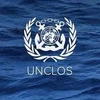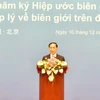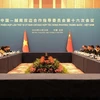Multifaceted cooperation between Vietnam and the Democratic People’s Republic of Korea (DPRK) has been enhanced markedly since establishing diplomatic ties 60 years ago (Jan. 31, 1950).
Under the leadership of the Communist Party of Vietnam and the Workers’ Party of the DPRK, along with efforts by the people, the traditional friendship and cooperation between the two sides have been continually developed.
The governments and people of the two countries have given each other both spiritual and material support in their national construction and defence efforts.
The two countries regularly exchanged visits at all levels. President Ho Chi Minh’s visit to DPRK in 1957 and Prime Minister Kim Il Sung’s visit to Vietnam in 1958 laid the foundation for the development of bilateral relations.
In 2002, President Tran Duc Luong visited the DPRK. Notably, in 2007, Party General Secretary Nong Duc Manh visited the DPRK, during which Manh held talks with Party General Secretary Kim Jong Il, elevating cooperation to a new height.
In May 2008, the two foreign ministries agreed to set up regular political consultative mechanism at the deputy ministerial level to discuss measures to boost cooperation. Since then, two conferences have been held—one in Pyongyang in 2008 and one in Hanoi in 2009.
In the reviewed period, economic relations between the two countries saw new developments.
In 2000, the two countries set up the Vietnam-DPRK Intergovernmental Committee on Cooperation in Economy, Science and Technology to strengthen bilateral economic ties. The 7th meeting of the committee was held in April 2009 in Hanoi , propagating many measures to expand economic cooperation.
Over the past 60 years, the two countries have signed many agreements, creating a legal foundation for bilateral ties. They included the Agreement on Scientific and Technological Cooperation of 1958, the Trade and Marine Agreement of 1962, the Agreement on Health Care Assistance of 1966, the Agreement on Civil Aviation Transport Cooperation of 1977, the Marine Transport Agreement of 2002, the Trade Agreement of 2002, the Agreement on Investment Encouragement and Protection of 2002 and the Agreement on Avoidance of Double Taxation of 2002.
Plentiful with natural resources, DPRK remains a strong potential market for Vietnamese businesses.
The two nations have also maintained cooperation in culture, education and friendship exchanges.
DPRK helped train hundreds of students for the Vietnamese side during its resistance war against the US. Many of them have held key positions in the State apparatus, actively contributing to national development and friendship between the two countries.
Vietnam annually sends performers to the Pyongyang Spring Arts Festival. DPRK’s coaches have been training Vietnamese national squads of Taekwondo and women’s soccer.
The Vietnam-DPRK Friendship Association and the DPRK-Vietnam Friendship Association were established to create a bridge to bolster friendship between the two peoples. The two organisations often jointly hold friendship activities and celebrations on the two countries’ anniversaries./.
Under the leadership of the Communist Party of Vietnam and the Workers’ Party of the DPRK, along with efforts by the people, the traditional friendship and cooperation between the two sides have been continually developed.
The governments and people of the two countries have given each other both spiritual and material support in their national construction and defence efforts.
The two countries regularly exchanged visits at all levels. President Ho Chi Minh’s visit to DPRK in 1957 and Prime Minister Kim Il Sung’s visit to Vietnam in 1958 laid the foundation for the development of bilateral relations.
In 2002, President Tran Duc Luong visited the DPRK. Notably, in 2007, Party General Secretary Nong Duc Manh visited the DPRK, during which Manh held talks with Party General Secretary Kim Jong Il, elevating cooperation to a new height.
In May 2008, the two foreign ministries agreed to set up regular political consultative mechanism at the deputy ministerial level to discuss measures to boost cooperation. Since then, two conferences have been held—one in Pyongyang in 2008 and one in Hanoi in 2009.
In the reviewed period, economic relations between the two countries saw new developments.
In 2000, the two countries set up the Vietnam-DPRK Intergovernmental Committee on Cooperation in Economy, Science and Technology to strengthen bilateral economic ties. The 7th meeting of the committee was held in April 2009 in Hanoi , propagating many measures to expand economic cooperation.
Over the past 60 years, the two countries have signed many agreements, creating a legal foundation for bilateral ties. They included the Agreement on Scientific and Technological Cooperation of 1958, the Trade and Marine Agreement of 1962, the Agreement on Health Care Assistance of 1966, the Agreement on Civil Aviation Transport Cooperation of 1977, the Marine Transport Agreement of 2002, the Trade Agreement of 2002, the Agreement on Investment Encouragement and Protection of 2002 and the Agreement on Avoidance of Double Taxation of 2002.
Plentiful with natural resources, DPRK remains a strong potential market for Vietnamese businesses.
The two nations have also maintained cooperation in culture, education and friendship exchanges.
DPRK helped train hundreds of students for the Vietnamese side during its resistance war against the US. Many of them have held key positions in the State apparatus, actively contributing to national development and friendship between the two countries.
Vietnam annually sends performers to the Pyongyang Spring Arts Festival. DPRK’s coaches have been training Vietnamese national squads of Taekwondo and women’s soccer.
The Vietnam-DPRK Friendship Association and the DPRK-Vietnam Friendship Association were established to create a bridge to bolster friendship between the two peoples. The two organisations often jointly hold friendship activities and celebrations on the two countries’ anniversaries./.



















